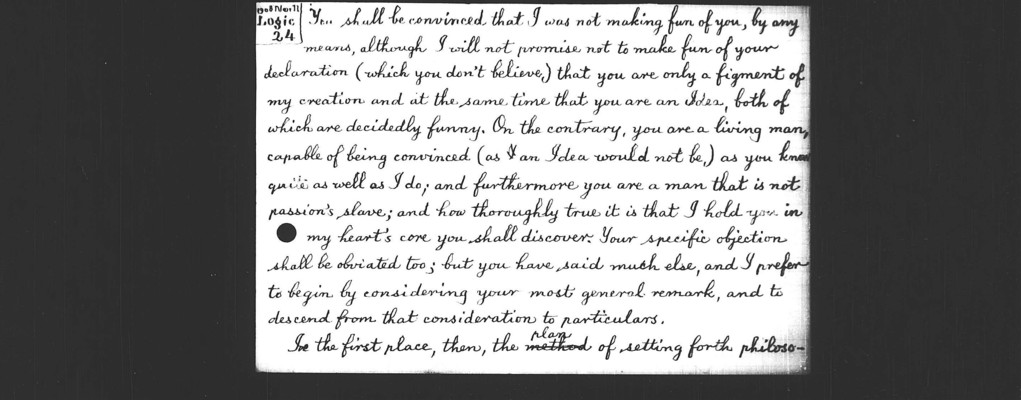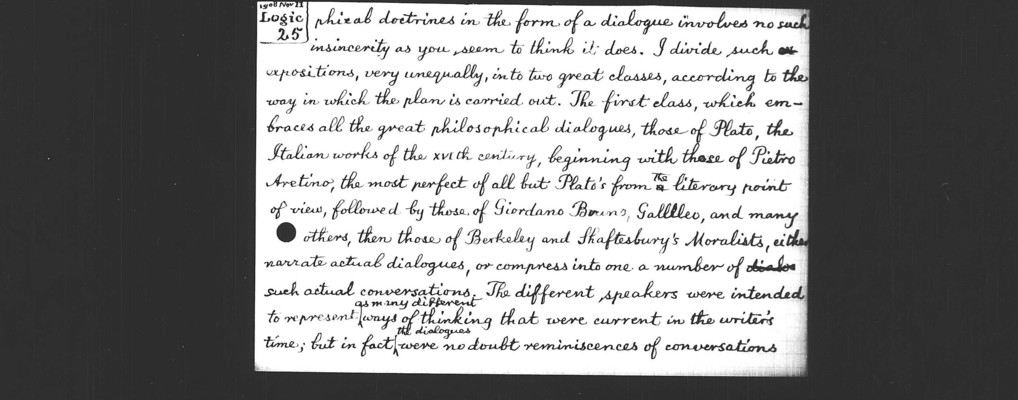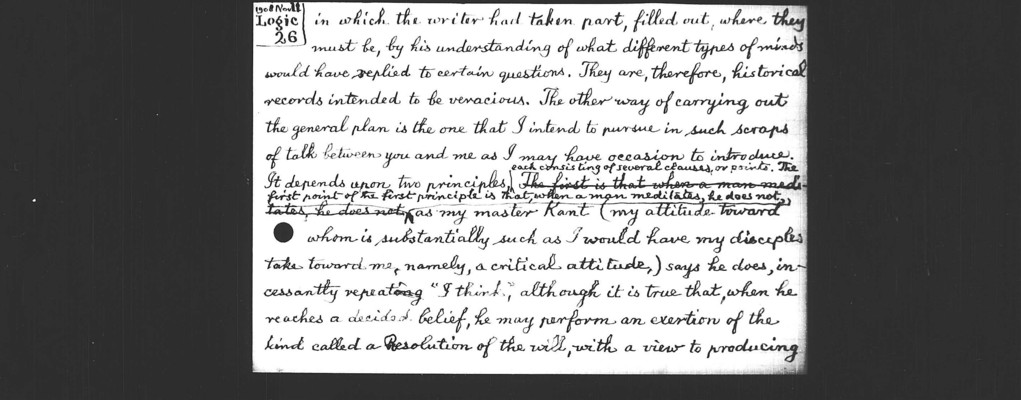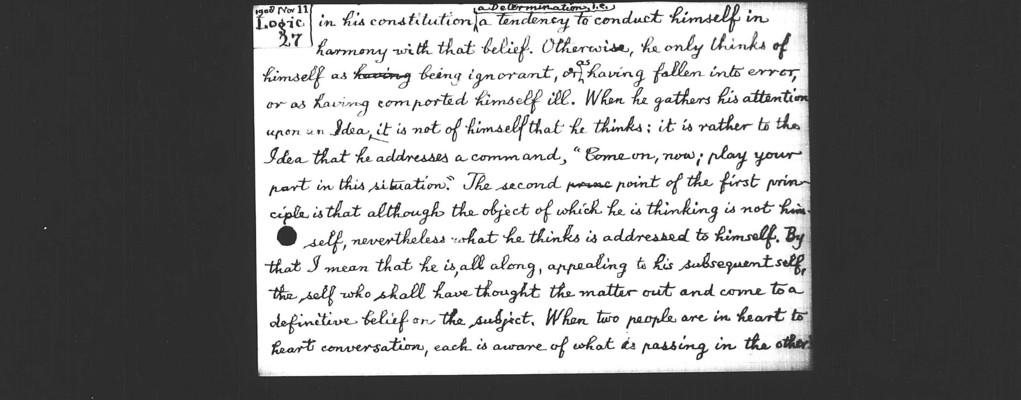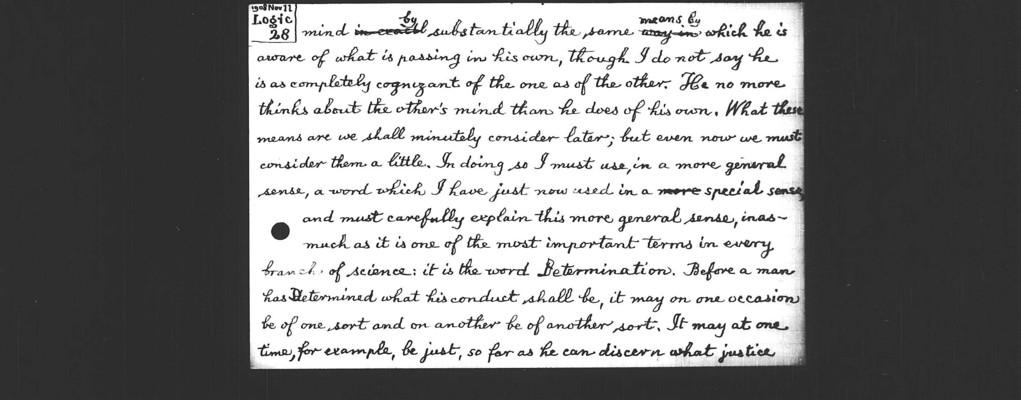Pages
40
1908 Nov 11 Logic 24
You shall be convinced that I was not making fun of you, by any means, although I will not promise not to make fun of your declaration (which you do not believe) that you are only a figment of my creation and at the same time that you are an Idea, both of which are decidedly funny. On the contrary, you are a living man capable of being convinced (as an Idea would not be,) as you know quite as well as I do; and furthermore you are a man that is not passion's slave; and how thoroughly true it is that I hold you in my heart's core you shall discover. Your specific objection shall be obviated too; but you have said much else, and I prefer to begin by considering your most general remark, and to descend from that consideration to particulars.
In the first place, then, the plan of setting forth philoso-
41
1908 Nov 11 Logic 25
phical doctrines in the form of a dialogue involves no such insincerity as you seem to think it does. I divide such (ex) expositions, very unequally, into two great classes, according to the way in which the plan is carried out. The first class, which em braces all the great philosophical dialogues, those of Plato, the Italian works of the XVIth century, beginning with these of Pietro Aretino, the perfect of all but Plato's from the literary point of view, followed by those of Giordano Bruno, Gallileo, and many others, then those of Berkeley and Shaftesbury's Moralists, either narrate actual dialogues, or compress into one a number of dialo such actual conversations. The different speakers were intended to represent as many different ways of thinking that were current in the writer's time; but in fact the dialogues were no doubt reminiscences of conversations
42
1908 Nov 11 Logic 26
in which the writer had taken part, filled out, where they must be, by his understanding of what different types of minds would have replied to certain questions. They are, therefore, historical records intended to be veracious. The other way of carrying out the general plan is the one that I intend to pursue in such scraps of talk between you and me as I may have occasion to introduce. It depends upon two principles, each consisting of several clauses, or points. The first point of the first principle is that, when a man meditates, he does not, as my master Kant (my attitude toward) whom is substantially such as I would have my disciples take toward me, namely, a critical attitude,) says he does, incessantly repeat: "I think," although it is true that, when he reaches a decided belief, he may perform an exertion of the kind called a Resolution of the will, with a view to producing
43
1908 Nov 11 Logic 27
in his constitution a Determination, i.e., a tendency to conduct himself in harmony with that belief. Otherwise, he only thinks of himself as being ignorant, or has having fallen into error, or as having comported himself ill. When he gathers his attention upon an Idea, it is not of himself that he thinks; it is rather to the Idea that he addresses a command, "Come on, now; play your part in this situation." The second point of the first principle is that although the object of which he is thinking is not himself, nevertheless what he thinks is addressed to himself. By that I mean that he is all along appealing to his subsequent self, the self who shall have thought the matter out and come to a definitive belief on the subject. When two people are in heart to heart conversation, each is aware of what is passing in the other
44
1908 Nov 11 Logic 28
mind by substantially the same means by which he is aware of what is passing in his own, though I do not say he is as completely cognizant of the one as of the other. He no more thinks about the other's mind than he does of his own. What these means are we shall minutely consider later; but even now we must consider them a little. In doing so I must use, in a more general sense, a word which I have just now used in a special sense, and must carefully explain this more general sense, inasmuch as it is one of the most important terms in every branch of science: it is the word Determination. Before a man has Determined what his conduct shall be, it may on one occasion be of one sort and on another of another sort. It may at one time, for example, be just, so far as he can discern what justice
